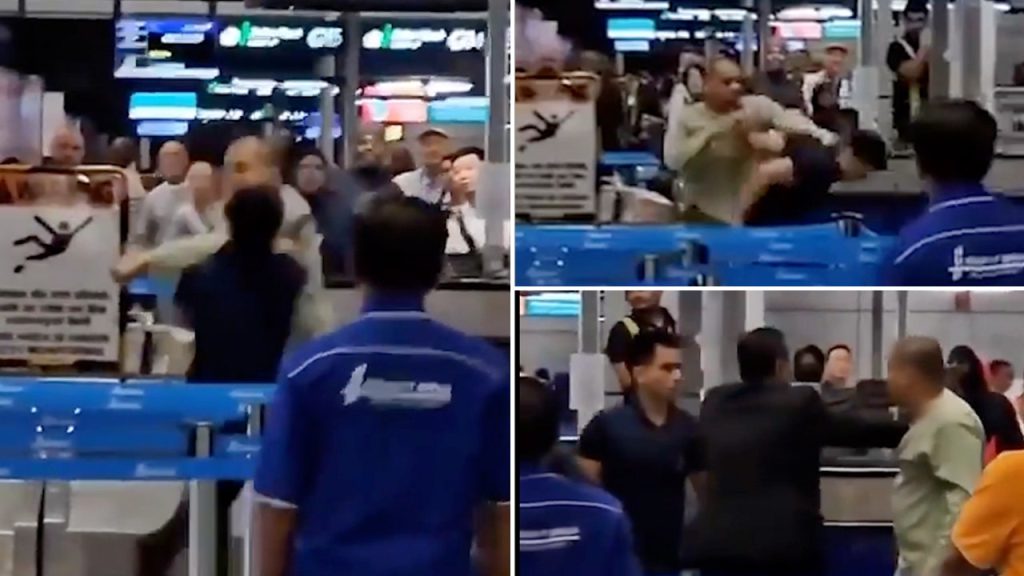A recent altercation at Kuala Lumpur International Airport (KLIA) dramatically highlights rising tensions among airline passengers and airport staff. On November 10, a furious passenger was caught on video attacking an airport worker over what appears to be a dispute related to a check-in delay. The footage shows the enraged passenger, dressed in a green top and army green pants, launching a series of punches at the worker from behind the check-in counter at Terminal 1. The incident has drawn attention not only for the physical violence involved but also as a reflection of broader issues related to travel frustrations that many individuals experience. The video captured moments of chaos, where the worker, in a bid to defend himself, cowered and then turned to confront his attacker.
As the confrontation escalated, the situation visibly shocked onlookers. The passenger, seemingly driven by anger over the delay, landed a vicious left hook on the worker, knocking him backward. This moment reflected not just personal frustration but also a mounting concern over how service delays can provoke extreme reactions from travelers, illustrating the precarious nature of interactions in high-stress environments such as airports. After staff attempted to intervene, security guards had to step in to separate the two, indicating the level of conflict that had arisen from what seemed to be a straightforward check-in issue. The scene presented an unsettling picture of growing tensions in the aviation industry, where frustrations can swiftly devolve into aggressive confrontations.
According to KLIA District Police Chief Assistant Commissioner Azman Shari’at, the dispute originated from a disagreement related to a delay in checking in for a flight. He confirmed that the altercation resulted in minor injuries to the staff member involved. Despite the serious nature of the incident, no arrests had been reported as of November 16, which raises questions about accountability in these types of confrontations, particularly when they involve physical violence. This was not an isolated incident: the global airline industry has seen a notable increase in unruly behavior from passengers, particularly in recent years as travel has rebounded following pandemic-related restrictions.
The issue of unruly airline passengers is compounded by the increasingly high-stress environment of modern air travel. Data from the Federal Aviation Administration (FAA) indicates that in 2023 alone, there were 2,075 reports of unruly behavior from passengers, leading to 512 investigations. Enforcement actions have also ramped up, with a combination of fines totaling approximately $7.5 million issued against those engaging in disruptive conduct. This surge in reports underlines a troubling trend where the frustrations of the flying public manifest not just as complaints but escalate into confrontations that can endanger both staff and fellow passengers.
Similar incidents have taken place in various locations, including a more severe case involving an American Airlines flight that saw an unruly passenger injure a crew member while attempting to exit the plane. Travellers on that flight were quick to take matters into their own hands, restraining the individual with tape, an action that highlights the often chaotic real-time responses from fellow passengers. The situation at KLIA emphasizes that while air travel can be routine for many, the tensions brought on by delays, cancellations, and staffing issues can provoke reactions that are far from ordinary.
Ultimately, the incident at KLIA serves as a stark reminder of the volatile nature of air travel and the need for effective conflict resolution strategies in airports. With increasing passenger numbers and expectations, airlines and airport authorities must address the underlying causes of traveler frustration while enhancing the safety and well-being of both staff and passengers. As the airline industry continues to navigate its recovery post-pandemic, maintaining civility and respect in these high-pressure environments will be essential to providing a better travel experience for everyone involved. Balancing the rights and needs of passengers with those of airline employees is crucial in mitigating situations that may lead to violence and ensure that air travel remains a safe mode of transportation.

